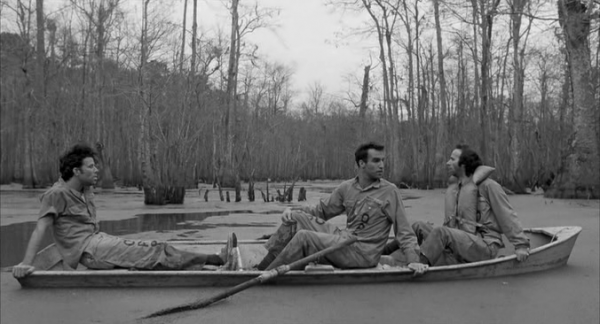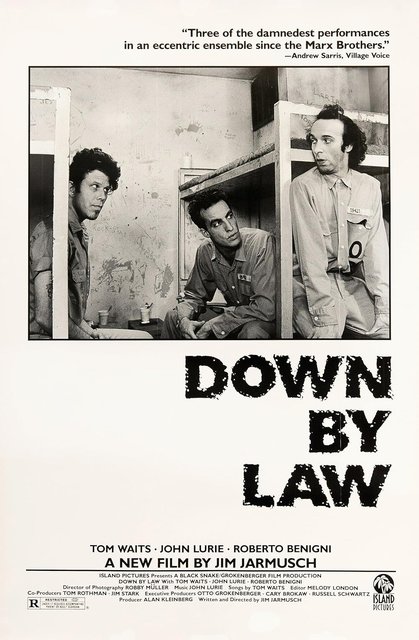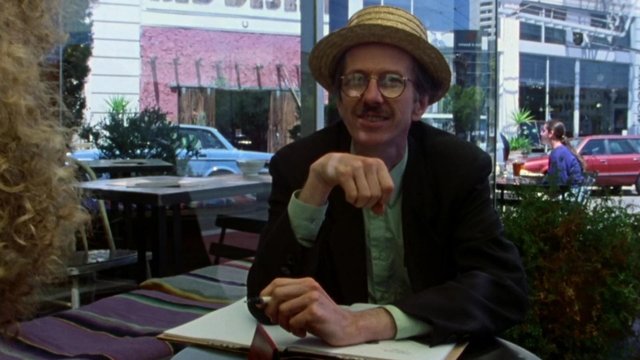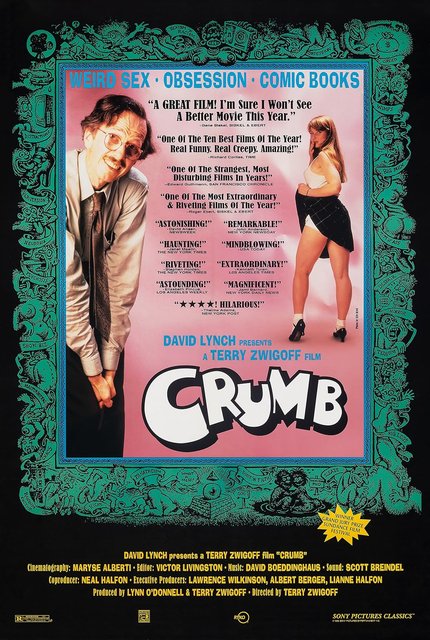
DOWN BY LAW (1986)
Directed by : Jim Jarmusch
I was declaring Jim Jarmusch one of my favourite filmmakers after having seen only one of his movies - 2005 Cannes Grand Prix winner Broken Flowers, which featured the inestimable talent of Bill Murray. That seems a lifetime ago, but in the interim, out of all six Jarmusch films I'd seen up to this point, I'd never seen anything he made previous to Dead Man (1995). Although this film, Down By Law, was made early in his career (his third feature), Jarmusch had progressed so far already that he seems to have mastery over all he needed to have to create his special brand of hip, music and poetry-driven quasi-noir brand of movie. It's like an art film that absolutely anyone could latch onto and enjoy, taking place in an astoundingly well-shot (the great Robby Müller served as cinematographer) New Orleans and Louisiana bayou, while featuring three characters thrust together by circumstance when put into the same jail cell. Zack (Tom Waits) is a DJ by profession and petty criminal on the side, hitting a low point in his life after leaving another job and seeing another girlfriend leave him. Jack (John Lurie) is a pimp who has been set up with an unseen underage girl. Roberto (Roberto Benigni) is an eccentric Italian card shark who has accidentally killed a man in self defence once caught in his cheating ways. These three will form the unlikeliest of bonds on an adventure which could prove a fresh start considering the dismal hole all three are in.
This is the kind of film that really feels ad-libbed, and while I don't know at all if this was the case, I'd venture that it was in many instances. There's a naturalism to the dialogue that simply doesn't feel like it's been written, and a genuine 'in-the-moment' freshness to each funny moment that seems too spontaneous to be anything other than improvisation. I loved it - it's genuinely funny when it needs to be, especially via the surprisingly funny Benigni, who I don't usually like. I have to admit, he's pretty hilarious in this which perhaps illustrates that he was ill-served by many of the movie projects he ended up being involved in. In the meantime Tom Waits had developed into a bona-fide full-fledged actor by this stage in his career. While I've seen a few of the movies John Lurie has appeared in (Paris, Texas, The Last Temptation of Christ, Get Shorty etc) I don't remember him in them, and he's the odd one out as far as being a performer I really know. He acquits himself well enough here, but it's Benigni that steals every scene he's in, and Waits that impresses the most. In the meantime the whole feature is a black and white visual feast, the beauty of this often contrasting with the more rugged, base and low-rent roughness of the characters themselves. At times though, there are long, still takes in which the interaction between these three takes center stage above and beyond anything else.
These days, this is my kind of movie. It's independent American cinema that is nonetheless technically brilliant and driven by a filmmaker who is pretty much well known without making many movies that you could call part of the mainstream - but that all means nothing if the movie itself isn't thoroughly enjoyable to watch and easy to appreciate. I guess I gathered very early on that Jarmusch made the kind of cinema that resonates with me (although I do dislike one of his films - The Limits of Control), and it's only a shame that he's not more prolific. When you watch Down By Law you're really struck by how much value these characters get from being forced into an uncomfortable proximity with each other - people they'd normally spit on if passing them on the street. Underneath the hostility and guarded aloofness there's a spiritual camaraderie waiting to be born that's of invaluable worth, and that's what really forms the core of the whole movie. It's something that's so transformative it's as beautiful as nature itself, which we see a lot of, and I don't think it's any accident that we start the film on dank city streets and end in the pristine wilderness. That's the kind of journey we take with Down By Law - another very excellent feature from the great Jim Jarmusch.
Glad to catch this one - Criterion #166 and in Steven Jay Schneider's 1001 Movies You Must See Before You Die. Nominated for then Palme d'Or at Cannes in 1986.

Watchlist Count : 452 (+/- 0)
Next : A Brighter Summer Day (1991)
Next : A Brighter Summer Day (1991)
Thank you very much to whomever inspired me to watch Down By Law
__________________
Remember - everything has an ending except hope, and sausages - they have two.
Latest Review : Before the Rain (1994)













